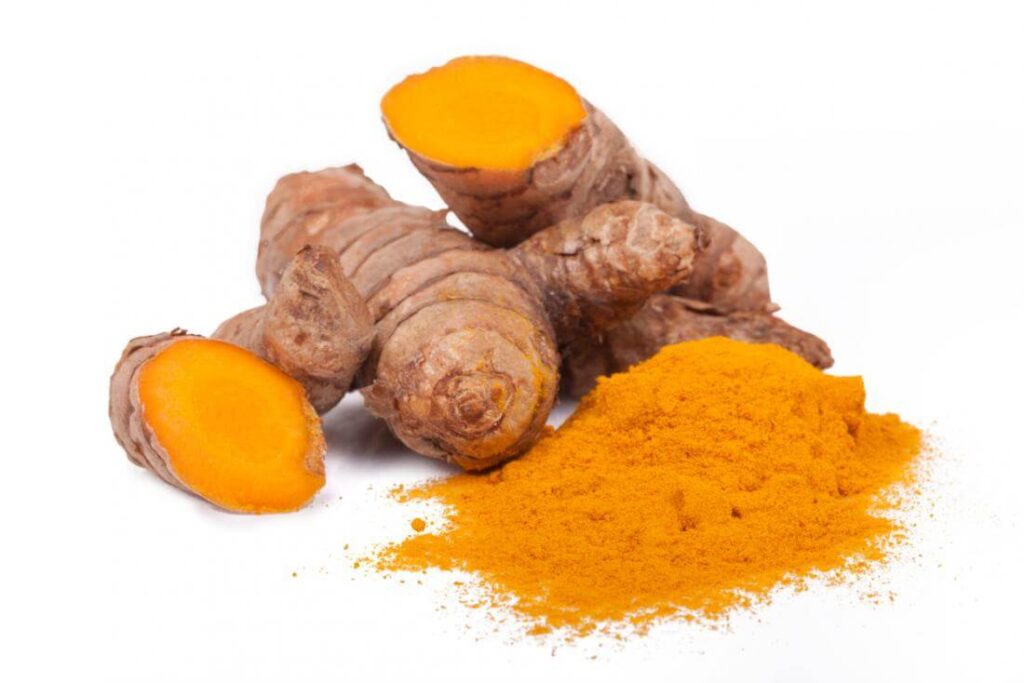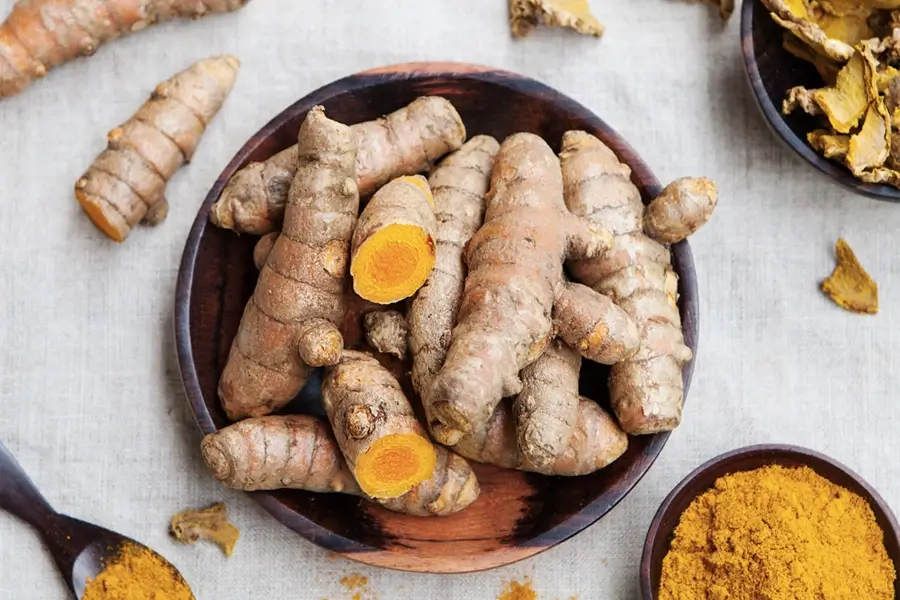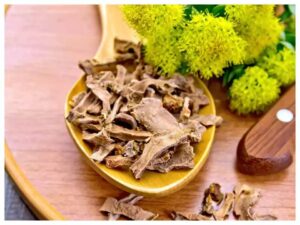The Origin of Tumeric: Where it was First Discovered
Tumeric, also known as Curcuma longa, is a plant that is native to Southeast Asia and has been used for its medicinal properties for centuries. Its distinctive yellow color and warm, slightly bitter flavor make it a popular ingredient in a variety of dishes, and recent research has shown that it has a number of potential health benefits. But where was tumeric first discovered? In this article, we will explore the origin of this versatile and medicinal spice.
Southeast Asia
Tumeric is believed to have originated in the forests of Southeast Asia, where it was used by the indigenous people for both culinary and medicinal purposes. The plant is a member of the ginger family and grows well in warm, moist climates, making it well-suited to the tropical conditions of Southeast Asia. The region has a long history of using spices and herbs for both cooking and healing, and tumeric was no exception.
The Spice Trade
As trade between Southeast Asia and the rest of the world developed, tumeric was one of the spices that was exported from the region. It was especially popular in India, where it was used as both a spice and a dye, and its use spread throughout the country. From India, the spice was eventually introduced to other parts of the world, including Europe, Africa, and the Middle East, where it was embraced for its unique flavor and numerous health benefits.
Culinary Uses
In the culinary world, tumeric is best known for its role in the traditional dishes of Southeast Asia, including Indian curries and Southeast Asian soups and stews. It is also used as a spice in a variety of other dishes, including rice, vegetables, and meats. In addition to its distinctive flavor, tumeric is prized for its bright yellow color, which adds visual appeal to a wide range of dishes.
Medicinal Properties
In addition to its culinary uses, tumeric has a long history of use as a medicinal plant. The active ingredient in tumeric is curcumin, which is believed to have anti-inflammatory, antioxidant, and anti-cancer properties. Some preliminary studies have suggested that tumeric may be effective in treating conditions such as arthritis, depression, and cardiovascular disease, and it is also being explored as a potential treatment for various types of cancer.
Tumeric is a versatile and medicinal spice that has been used for centuries in Southeast Asia and throughout the world. From its humble beginnings in the forests of Southeast Asia, tumeric has been embraced for its unique flavor and numerous health benefits, and its popularity shows no sign of slowing down. Whether used as a spice in cooking or as a natural remedy for various health conditions, tumeric is sure to remain a staple in kitchens and medicine cabinets for generations to come.

The Health Benefits of Tumeric
Anti-Inflammatory Properties
One of the most well-known health benefits of tumeric is its powerful anti-inflammatory properties. Inflammation is a natural response of the body to injury or infection, but when it becomes chronic, it can lead to a number of health problems, including arthritis, heart disease, and cancer. Tumeric has been shown to reduce inflammation in the body, which can help to prevent and treat a variety of health conditions.
The active ingredient in tumeric, curcumin, is responsible for its anti-inflammatory properties. Curcumin works by inhibiting the production of cytokines and enzymes that cause inflammation in the body. This makes tumeric an effective natural alternative to non-steroidal anti-inflammatory drugs (NSAIDs), which are commonly used to treat inflammation but can have a number of unpleasant side effects.
In addition to reducing inflammation, tumeric has also been shown to have a pain-relieving effect, making it a useful natural remedy for conditions such as osteoarthritis and rheumatoid arthritis. Some studies have even shown that tumeric is as effective as some over-the-counter pain medications, without the risk of side effects.
Antioxidant Properties
Tumeric is also rich in antioxidants, which help to protect the body from the damaging effects of free radicals. Free radicals are unstable molecules that can cause damage to cells and contribute to the development of various health problems, including heart disease, cancer, and Alzheimer’s disease. Antioxidants help to neutralize free radicals and protect the body from their damaging effects.
The antioxidants in tumeric are particularly effective in protecting the body against oxidative stress, which is a condition in which the body is exposed to an excessive amount of free radicals. Oxidative stress can damage cells and contribute to the development of various health problems, including heart disease, cancer, and age-related diseases such as Alzheimer’s disease. By reducing oxidative stress, tumeric can help to protect the body against these health problems.
Cardiovascular Health
Tumeric has been shown to have a positive effect on cardiovascular health. Research has shown that tumeric can help to lower blood pressure, reduce the risk of heart disease, and improve blood flow to the heart. It is also believed to help prevent the formation of blood clots, which can lead to heart attack and stroke.
The anti-inflammatory and antioxidant properties of tumeric are believed to be responsible for its positive effect on cardiovascular health. By reducing inflammation and oxidative stress, tumeric can help to protect the heart and blood vessels, reducing the risk of heart disease and stroke. Additionally, tumeric has been shown to improve cholesterol levels, which is another important factor in reducing the risk of heart disease.
Brain Health
Tumeric has been shown to have a positive effect on brain health, particularly in the areas of memory and mood. Some research has suggested that tumeric may be effective in treating depression and anxiety, as well as improving memory and cognitive function. Additionally, tumeric has been shown to have a neuroprotective effect, which means that it can help to protect the brain from damage and improve overall brain health.
The active ingredient in tumeric, curcumin, has been shown to have a positive effect on the levels of brain-derived neurotrophic factor (BDNF), which is a protein that plays an important role in the growth and survival of nerve cells in the brain. Low levels of BDNF have been linked to a number of brain-related health problems, including depression, Alzheimer’s disease, and Parkinson’s disease. By increasing the levels of BDNF in the brain, tumeric may help to improve brain function and reduce the risk of these health problems.
Potential Anti-Cancer Properties
Tumeric has been shown to have potential anti-cancer properties. Some research has suggested that tumeric may help to prevent the development of cancer, as well as slow the growth of cancerous cells. This is thought to be due to the antioxidant and anti-inflammatory properties of tumeric, which help to protect the body against cellular damage and reduce the risk of cancer.
In addition to its potential anti-cancer properties, tumeric has also been shown to have a positive effect on cancer treatment. Some studies have suggested that tumeric may enhance the effectiveness of chemotherapy and radiation therapy, while also reducing the side effects of these treatments. More research is needed in this area, but the early results are promising and suggest that tumeric may be a useful addition to cancer treatment.
Improved Digestion
Tumeric has also been shown to have a positive effect on digestive health. Some research has suggested that tumeric may help to reduce symptoms of indigestion and bloating, as well as improve the overall health of the digestive system. This is thought to be due to the anti-inflammatory and antioxidant properties of tumeric, which can help to reduce inflammation and oxidative stress in the digestive system.
Additionally, tumeric has been shown to have a positive effect on gut bacteria, which is important for overall digestive health. By improving the balance of gut bacteria, tumeric may help to reduce the risk of digestive problems, including irritable bowel syndrome (IBS) and inflammatory bowel disease (IBD).
Improved Skin Health
Tumeric has also been shown to have a positive effect on skin health. Some research has suggested that tumeric may help to reduce the appearance of fine lines and wrinkles, as well as improve skin tone and texture. Additionally, tumeric has been shown to have a protective effect against sun damage, which can help to reduce the risk of skin cancer.
The anti-inflammatory and antioxidant properties of tumeric are believed to be responsible for its positive effect on skin health. By reducing inflammation and oxidative stress, tumeric can help to protect the skin against cellular damage and improve overall skin health.
In conclusion, tumeric is a powerful spice with numerous health benefits. From reducing inflammation and oxidative stress to improving brain health, cardiovascular health, and skin health, tumeric is a versatile spice that can be a valuable addition to any diet. To maximize the health benefits of tumeric, it is recommended to consume it regularly in small doses, either in its raw form or as a supplement.

Nutritional Components of Turmeric
Curcumin
Curcumin is the primary active ingredient in turmeric and is responsible for many of its health benefits. Curcumin is a powerful antioxidant and anti-inflammatory agent, and has been shown to have a number of positive effects on human health. It is also responsible for turmeric’s bright yellow color.
Essential Oils
Turmeric also contains essential oils, which are a group of compounds that have a number of health benefits. These oils contain compounds such as turmerone, which is thought to help improve memory and cognitive function, and zingiberene, which has anti-inflammatory and pain-relieving properties.
Vitamins and Minerals
Turmeric is also rich in a variety of vitamins and minerals, including vitamin B6, magnesium, and iron. These nutrients play important roles in various bodily functions and help to maintain good health. Vitamin B6, for example, is involved in the production of neurotransmitters, which play a key role in regulating mood and sleep. Magnesium helps to regulate blood pressure and support bone health, while iron is essential for producing hemoglobin and transporting oxygen in the blood.
Fiber
Tumeric is a good source of fiber, which is important for maintaining good digestive health. Fiber helps to promote healthy bowel movements, as well as reducing the risk of digestive problems such as constipation and hemorrhoids.
Potassium
Tumeric is a good source of potassium, which is an important mineral for maintaining good health. Potassium is involved in a wide range of bodily functions, including regulating blood pressure, maintaining healthy heart function, and supporting good muscle and nerve function.
Manganese
Tumeric is a good source of manganese, which is an important mineral for maintaining good health. Manganese is involved in a wide range of bodily functions, including the metabolism of carbohydrates and fat, the production of sex hormones, and the maintenance of healthy bones.
How these ingredients contribute to the health benefits of Turmeric
The combination of these nutritional components makes turmeric a highly beneficial addition to a healthy diet. By combining its powerful anti-inflammatory and antioxidant effects, turmeric can help to protect against a wide range of health issues, including heart disease, Alzheimer’s disease, and certain forms of cancer.
Curcumin, in particular, has been shown to have a number of positive effects on human health, including reducing inflammation, improving brain function, and reducing the risk of heart disease. Its antioxidant properties help to protect cells against damage caused by free radicals, which can contribute to the development of various diseases and health problems.
Essential oils also play a key role in the health benefits of turmeric. By improving cognitive function, reducing inflammation, and relieving pain, essential oils can help to improve overall health and well-being. They also contribute to turmeric’s distinctive flavor, making it a popular ingredient in cooking and traditional medicine.
In addition to its anti-inflammatory and antioxidant properties, turmeric’s rich vitamin and mineral content also contribute to its health benefits. By providing the body with important nutrients, turmeric can help to maintain overall health and well-being, and support various bodily functions.
By incorporating turmeric into your diet, you can enjoy its many health benefits and help to protect against a range of health problems. Whether you add it to your cooking, take it as a supplement, or enjoy it as a tea, turmeric is a simple and delicious way to boost your health and well-being.

Methods for Consuming Turmeric
Turmeric can be consumed in a variety of ways, including in its raw form, as a supplement, or as an ingredient in food. Here are some of the most common methods for consuming turmeric:
Raw Turmeric
Raw turmeric can be grated and added to salads, soups and sauces for a mild, earthy flavor. It can also be blended with other spices to make flavorful chutneys, dips and marinades.
Supplements
Turmeric supplements come in a variety of forms, including capsules, tablets, and liquids. Supplements are a convenient way to get a concentrated dose of curcumin, the active ingredient in turmeric. However, it is important to follow the dosage instructions on the label and talk to your doctor before taking any supplements.
Turmeric Tea
Turmeric tea is made by boiling turmeric root in water and adding other herbs and spices, such as ginger and black pepper, for flavor. This tea is believed to have many health benefits, including reduced inflammation and improved digestion.
Turmeric Powder
Turmeric powder is made by drying and grinding the turmeric root into a fine powder. The powder can be used to make a variety of dishes, including curries, soups, and sauces. It can also be used as a natural food dye and as a condiment for meats, fish and vegetables.
Turmeric Milk
Turmeric milk is made by combining turmeric powder, milk and other spices, such as cardamom and cinnamon. This drink is believed to have many health benefits, including improved digestion and reduced inflammation.
Turmeric Paste
Turmeric paste is made by combining turmeric powder, water and other spices. This paste can be used as a marinade for meats, as a condiment for vegetables, or as a flavoring for soups and sauces.
Curries
Curries are a type of dish made with a combination of spices, vegetables, and either meat or fish. Turmeric is a key ingredient in many curries and is believed to have many health benefits.
Golden Milk
Golden milk is a popular Ayurvedic drink made by combining turmeric, milk and other spices. This drink is believed to have anti-inflammatory and antioxidant properties and may help reduce pain and improve digestion.
Turmeric Extracts
Turmeric extracts are made by extracting the active ingredients from the turmeric root. These extracts can be taken as supplements or added to food for a burst of flavor.
Spices Blends
Spice blends are a combination of spices, such as turmeric, ginger and black pepper, that can be added to food for flavor. These spice blends are believed to have many health benefits and can be used to make a variety of dishes, from curries to soups.

Potential Side Effects of Tumeric
Despite its many health benefits, tumeric can cause some side effects, especially when taken in large doses or for a long period of time. Some of the most common side effects of tumeric include:
1. Stomach problems
Tumeric can cause stomach problems such as nausea, bloating, and diarrhea. This is because it stimulates the production of bile, which can lead to digestive problems. If you experience any of these symptoms after taking tumeric, you should stop using it and talk to your doctor.
2. Skin irritation
Tumeric can cause skin irritation, especially when applied to the skin in its pure form. If you have sensitive skin, it is best to avoid using tumeric as a skin treatment.
3. Increased risk of bleeding
Tumeric can increase the risk of bleeding, especially if you take it with blood-thinning medications such as aspirin or warfarin. If you are taking blood-thinning medications, it is important to talk to your doctor before taking tumeric.
4. Interaction with medications
Tumeric can interact with certain medications, such as antidepressants, blood-sugar-lowering drugs, and chemotherapy drugs. If you are taking any of these medications, it is important to talk to your doctor before taking tumeric.
5. Liver problems
Tumeric supplements have been linked to liver problems, including liver damage and liver failure. If you experience any symptoms of liver problems after taking tumeric, such as yellowing of the skin or eyes, dark urine, or abdominal pain, you should stop taking it and talk to your doctor.
When to Avoid Taking Tumeric
Tumeric is generally considered safe when taken in the recommended doses, but there are some situations in which you should avoid taking it:
1. Pregnancy and breastfeeding
Tumeric is not recommended for women who are pregnant or breastfeeding. There is not enough research to determine whether tumeric is safe for use during pregnancy or breastfeeding, and it is best to avoid taking it until more information is available.
2. Gallbladder problems
Tumeric can worsen gallbladder problems, and it is not recommended for people with gallstones or other gallbladder problems. If you have a history of gallbladder problems, it is best to avoid taking tumeric.
3. Surgery
Tumeric can increase the risk of bleeding during and after surgery, and it is best to avoid taking it for at least two weeks before and after surgery.
4. Blood-clotting disorders
Tumeric can increase the risk of bleeding in people with blood-clotting disorders, and it is best to avoid taking it if you have a history of bleeding disorders.
5. Inflammatory bowel disease
Tumeric may worsen symptoms in people with inflammatory bowel disease, and it is best to avoid taking it if you have this condition.
Dosage and Preparation
Tumeric supplements are available in various forms, including capsules, tablets, and tumeric powder. The recommended dosage of tumeric varies depending on the form and the reason for taking it. It is important to follow the instructions on the product label and to talk to your doctor before taking tumeric, especially if you have a medical condition or are taking medications.
In conclusion, while tumeric has many health benefits, it is important to be aware of its potential side effects and to avoid taking it in certain situations. If you experience any side effects after taking tumeric, it is important to stop taking it and to talk to your doctor. As with any supplement, it is important to use tumeric responsibly and to follow the recommended dosages and guidelines.
The Drug Interactions of Tumeric
Tumeric can interact with certain medications, affecting their effectiveness and potentially causing harmful side effects. Some of the most common drug interactions with tumeric include:
1. Antidepressants
Tumeric can interact with certain antidepressants, such as fluoxetine (Prozac) and imipramine (Tofranil), potentially reducing their effectiveness and causing side effects. If you are taking antidepressants, it is important to talk to your doctor before taking tumeric.
2. Blood-sugar-lowering drugs
Tumeric can interact with blood-sugar-lowering drugs, such as glimepiride (Amaryl) and glyburide (DiaBeta), potentially lowering blood sugar levels too much. If you are taking blood-sugar-lowering drugs, it is important to monitor your blood sugar levels closely and to talk to your doctor before taking tumeric.
3. Chemotherapy drugs
Tumeric can interact with certain chemotherapy drugs, such as paclitaxel (Taxol) and doxorubicin (Adriamycin), potentially reducing their effectiveness and causing side effects. If you are undergoing chemotherapy, it is important to talk to your doctor before taking tumeric.
4. Blood-thinning medications
Tumeric can increase the risk of bleeding in people taking blood-thinning medications, such as aspirin and warfarin (Coumadin). If you are taking blood-thinning medications, it is important to talk to your doctor before taking tumeric.
It is important to keep in mind that these are just some of the potential drug interactions with tumeric, and that other medications may also interact with tumeric. If you are taking any medications, it is important to talk to your doctor before taking tumeric to ensure that it is safe for you to use.






